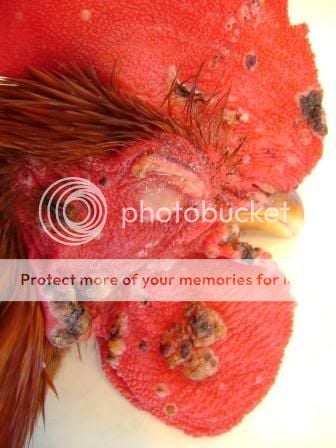Quote:
You may have to have someone help you hold the chicken so you can look into their mouths but that is only if you suspect wet pox.
I have Bantams so mine are easy to handle by one person and i don't routinely check their mouths i discovered the wet pox after mine had come down with the dry form.
Mine started out as Dry pox and i had got info from the web on how fowl pox could turn into Wet pox.
The first to come down with the wet was a rooster and i noticed his breathing was labored and his mouth was slightly open so i checked him and found a Large Mass in his throat.
My removing them and using the iodine for swabbing was strictly experimental on my part because i was told there was nothing i could do.
I refused to watch my chickens die from this and so i set forth to cure them myself so i thought if iodine healed the Dry pox then it only stood to reason it would heal the wet.
I opened their mouths then used a Q'tip to remove the masses and then swab their mouths and throats really well.
The procedure was traumatic for both the chicken and me but if they were to survive i had to do something to see if i could stop the growths.
I had to stop and let the chicken catch it's breath and recover several times during the procedure because not only were they in shock from the procedure they were also in pain.
To my wonderful surprise it worked and worked well the growth's did return but were smaller each day it took about a week for them to completely disapper
The chickens would begin drinking the same day as i did the procedure and eating by the next day.
The 6 chickens i lost were young ones the pox was just too much for them and a couple died within 24 hours of getting it because these lesion can grow fast.
I isolated some of the ones that had not gotten either the dry or wet and it seemed to work so don't hesitate to isolate the well ones away from the infected ones.
In the end after a month of trying to get it under control i chose to vaccinate the remaining 50 chickens to stop the spread.
It started in October and i treated the last case of Dry pox in early December and those were the longest months i have ever had to deal with anything in the 8 years i have had chickens.
I wanted to say also some have said to use antibiotics during the wet pox i did not do this as the chickens systems were already under enough stress from the pox and lesions and i personally didn't feel the antibiotics were necessary.
Mine never suffered any infections or ill effects from the wet pox or dry after the throat lesions and dry pox healed.
Hope this helps if there is something i missed or something you don't understand please let me know and
 i know how hard this is
i know how hard this is
You may have to have someone help you hold the chicken so you can look into their mouths but that is only if you suspect wet pox.
I have Bantams so mine are easy to handle by one person and i don't routinely check their mouths i discovered the wet pox after mine had come down with the dry form.
Mine started out as Dry pox and i had got info from the web on how fowl pox could turn into Wet pox.
The first to come down with the wet was a rooster and i noticed his breathing was labored and his mouth was slightly open so i checked him and found a Large Mass in his throat.
My removing them and using the iodine for swabbing was strictly experimental on my part because i was told there was nothing i could do.
I refused to watch my chickens die from this and so i set forth to cure them myself so i thought if iodine healed the Dry pox then it only stood to reason it would heal the wet.
I opened their mouths then used a Q'tip to remove the masses and then swab their mouths and throats really well.
The procedure was traumatic for both the chicken and me but if they were to survive i had to do something to see if i could stop the growths.
I had to stop and let the chicken catch it's breath and recover several times during the procedure because not only were they in shock from the procedure they were also in pain.
To my wonderful surprise it worked and worked well the growth's did return but were smaller each day it took about a week for them to completely disapper
The chickens would begin drinking the same day as i did the procedure and eating by the next day.
The 6 chickens i lost were young ones the pox was just too much for them and a couple died within 24 hours of getting it because these lesion can grow fast.
I isolated some of the ones that had not gotten either the dry or wet and it seemed to work so don't hesitate to isolate the well ones away from the infected ones.
In the end after a month of trying to get it under control i chose to vaccinate the remaining 50 chickens to stop the spread.
It started in October and i treated the last case of Dry pox in early December and those were the longest months i have ever had to deal with anything in the 8 years i have had chickens.
I wanted to say also some have said to use antibiotics during the wet pox i did not do this as the chickens systems were already under enough stress from the pox and lesions and i personally didn't feel the antibiotics were necessary.
Mine never suffered any infections or ill effects from the wet pox or dry after the throat lesions and dry pox healed.
Hope this helps if there is something i missed or something you don't understand please let me know and







